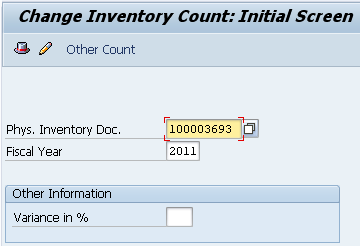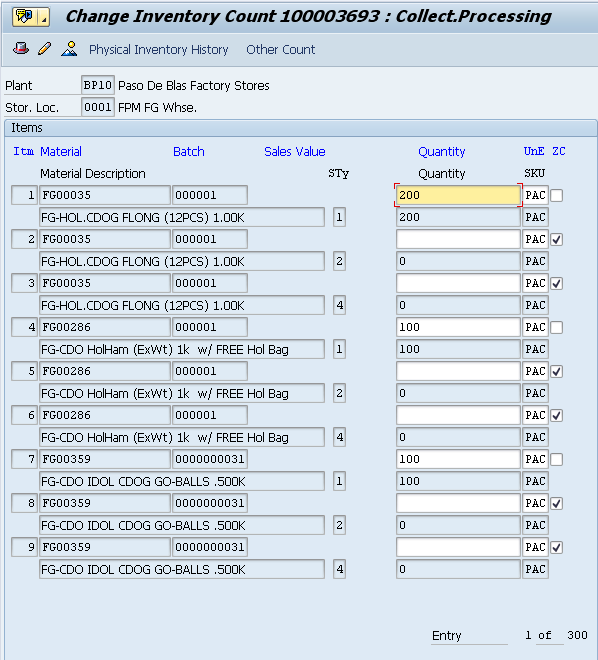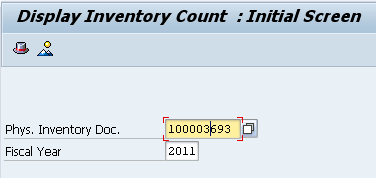Creating Physical Inventory Document (PID)
Procedure
1. Access the transaction using:
SAP Graphical User Interface (SAP GUI)
2. On the Initial Screen, fill - in the following:
| Field Name |
User action and values |
Comment |
| Plant |
Ex. BP02 |
Plant on which inventory is carried on |
| Storage Location |
Ex. 0001 |
where materials are stored |
| Material Marked for Deletion |
Ex. Unchecked |
To exclude items which are already marked for deletion (inactive) |
| Control |
Ex. Select data and issue log |
To provide control for the user to select list of items to be included in the document |
| Name of Session |
Ex. BP02MMM0001 |
For identification of who created the PID
Format: Plant + Initials + Sloc |
| Issue Log |
Ex. Checked |
Specifies that a log is issued onscreen after processing. |
| Max. No. Items / Doc |
Ex. 300 |
To maximize line items of each documents |
| Selection Acc. to Stock Balance |
|
|
| Unrestricted Use |
Ex. Checked |
Indicates that the unrestricted-use stock is affected by the transaction (goods movement, physical inventory). |
| Incl. Matls Subj. to Phys. Inv. |
Ex.Checked |
Selects for physical inventory those materials for which a physical inventory has already been carried out. |
| Data in Phys. Inv. Docmt Header |
|
|
| Planned Count Data |
|
Indicates the date on which the physical inventory count is to take place. |
| Set posting block |
Ex. Checked |
Indicates that no goods movements involving the materials listed in the physical inventory document can be posted for the duration of a physical inventory count. |



Click Acc. to Stck

button in Selection Acc. to Stock Balance.
3. Click the
Execute 
button. List of per Material, Stock Type and Batch will be displayed.
4. Click
Select All 
button to select all line items and then click
Create Documents 
button. List of Physical Inventory Documents created will be displayed.
Result
Physical Inventory Documents have been created for items in storage location 0001.

To create PID for
Stock Types: In Quality Inspection, repeat nos 1 - 4.
| Field Name |
User action and values |
Comment |
| Selection Acc. to Stock Balance |
|
|
| In Quality Inspection |
Ex. Checked |
Indicates that the stock in quality inspection is affected by the transaction (goods movement, physical inventory). |
| Incl. Matls Subj. to Phys. Inv. |
Ex. Checked |
Selects for physical inventory those materials for which a physical inventory has already been carried out. |

To create PID for
Stock Types: Blocked, repeat nos 1 - 4.
| Field Name |
User action and values |
Comment |
| Selection Acc. to Stock Balance |
|
|
| Blocked |
Ex. Checked |
Indicates that the blocked stock is affected by the transaction/event (goods movement, physical inventory). |
| Incl. Matls Subj. to Phys. Inv. |
Ex. Checked |
Selects for physical inventory those materials for which a physical inventory has already been carried out. |
Displaying List of Physical Inventory Documents (PID)
Procedure
1. Access the transaction using:
SAP Graphical User Interface (SAP GUI)
2. On the Initial Screen, fill-in the following:
| Field Name |
User action and values |
Comment |
| Plant |
Ex. BP10 |
Plant on which inventory is carried on |
| List Diaplay |
Ex. Group by Physical Inventory Document |
To group list by PID; for ease in viewing |
| Storage Location |
Ex. Blank |
Optional, to display list per storage location or just display all PID |
3. Click the
Execute 
button. List per PID will be displayed.
Result
List of items per PID will be displayed.
Deleting Physical Inventory Documents (PID)
Procedure
1. Access the transaction using:
SAP Graphical User Interface (SAP GUI)
2. On the Initial Screen, fill - in the following:
| Field Name |
User action and values |
Comment |
| Phys. Inventory Doc. |
Ex. 100001513 |
PID to be deleted |
| Fiscal Year |
Ex. 2011 |
Year on which PID was created |
3. Click the
Delete 
button. A confirmation message will be displayed. Click
Yes to confirm or
No to cancel deletion
Result
PID deleted. New PID number for the items in the deleted PID can now be regenerated.
Printing Physical Inventory Document
Procedure
1. Access the transaction using:
SAP Graphical User Interface (SAP GUI)
2. On the Initial Screen, fill - in the following:
| Field Name |
User action and values |
Comment |
| Fiscal Year |
Ex. 2011 |
Year when PID was created |
| Plant |
Ex. Bp10 |
Plant on which PID was carried out |
3. Click
Execute 
button. A Print Dialog box will appear, click
Print. Printout like the one below will be displayed.
Result
You now have a hard copy of the PID. Use that copy to record the count of material. This will then be used as reference in entering the material count in the next process.
Entering Inventory Count
Procedure
1. Access the transaction using:
SAP Graphical User Interface (SAP GUI)
2. On the Initial Screen, fill - in the following:
| Field Name |
User action and values |
Comment |
| Phys. Inventory Doc. |
Ex. 100003693 |
PID no |
| Fiscal Year |
Ex. 2011 |
Year when PID was created |
| Count Date |
Ex. 01/25/2011 |
Date of the actual inventory count |
3. Press
Enter or click the
Collective Processing 
button. List of items contained in the document will be displayed.
4. Enter the actual count for each material.
Check 
the corresponding
ZC column for items with zero (0) inventory. Click any of the
Page navigation tools

to proceed from one page to another.
5. Click
Save 
button to save count.
Result
Count has been assigned for each material in the PID.
Changing Inventory Count
Procedure
1. Access the transaction using:
SAP Graphical User Interface (SAP GUI)
2. On the Initial Screen, fill - in the following:
| Field Name |
User action and values |
Comment |
| Phys. Inventory Doc. |
Ex. 100003693 |
PID no |
| Fiscal Year |
Ex. 2011 |
Year when PID was created |
3. Press
Enter or click the
Collective Processing 
button. List of items contained in the document will be displayed.
4. Enter the new value for the count for each material.
Check 
the corresponding
ZC column for items with zero (0) inventory. Click any of the
Page navigation tools

to proceed from one page to another.
5. Click
Save 
button to save count.
Result
Count has been changed for each material in the PID.
Displaying Inventory Count
Procedure
1. Access the transaction using:
SAP Graphical User Interface (SAP GUI)
2. On the Initial Screen, fill - in the following:
| Field Name |
User action and values |
Comment |
| Phys. Inventory Doc. |
Ex. 100003693 |
PID no |
| Fiscal Year |
Ex. 2011 |
Year when PID was created |
Result
List of items contained in the document will be displayed.
List Count Differences
Procedure
1. Access the transaction using the following navigation option:
Option 1: SAP Graphical User Interface (SAP GUI)
| SAP ECC menu |
Logistics → Logistics Execution → Internal Whse Processes → Physical Inventory → In Inventory Management → Difference → Difference List |
| Transaction code |
MI20 |
2. On the initial screen, enter the following values:
| Field Name |
User action and values |
| Plant |
|
| Physical Inventory Document |
Enter your inventory document number if not already proposed by system |
Result
The system generates a report of count differenced which can be printed if required.
Recount
Use
This step is only necessary if the warehouse manager or controller decides to recount a material.
Procedure
1. Access the transaction using the following navigation option:
Option 1: SAP Graphical User Interface (SAP GUI)
| SAP ECC menu |
Logistics → Logistics Execution → Internal Whse Processes → Physical Inventory → In Inventory Management → Count Results → Recount |
| Transaction code |
MI11 |
2. On the initial screen, enter the following values and choose
Enter.
| Field Name |
User action and values |
| Physical Inventory Document |
Enter your physical inventory document number |
| Planned Count date |
Change if different from original planned count date |
3. Select materials to recount and choose Save.
4. Repeat steps from Printing of PI documents.
Result
A new physical inventory document is created.
Post Differences
Use
Once the count is reviewed by the Warehouse Manager, the Warehouse Monitoring can post the inventory count differences.
Procedure
1. Access the transaction using the following navigation option:
Option 1: SAP Graphical User Interface (SAP GUI)
| SAP ECC menu |
Logistics → Logistics Execution → Internal Whse Processes → Physical Inventory → In Inventory Management → Difference → Difference List |
| Transaction code |
MI20 |
2. On the initial screen, enter the following values:
| Field Name |
User action and values |
| Plant |
|
| Physical Inventory Document |
Enter your Physical Inventory Document number if not yet proposed by system |
4. On the List of Inventory Differences screen, select the relevant document(s) and choose Post Difference.
5. On the following screen choose Save.
Result
- The system generates material document(s), accounting document(s), and controlling document(s).
- Financial Postings
| Posting Key |
Account |
Description |
Note |
| 89 / 99 |
131000 or
135010 or
133000 |
Inventory raw materials
Trading goods
Semi - finished products |
Depending on material type |
| 91 / 81 |
520010 |
Gain / Loss - inventory diffs |
|
Appendix
Reversal of Process Steps
See the Recount section for the reversal handling. Alternatively input errors can be corrected by going through the complete process again.
Design Considerations / Assumptions
Due to the delay between a material movement and the posting of that movement, there is a short-term discrepancy between actual warehouse stock and book inventory. To avoid such a discrepancy during physical inventory, materials can be blocked for posting during the physical inventory. The inventory count and adjustment scenario does not block materials as this step is only necessary if physical counts were to take place during normal operations.
You can set a posting block in the following two ways, if required:
- You block the relevant materials when you enter the physical inventory document. This is recommended if you create the physical inventory document immediately before the count.
- You block the relevant materials later by changing the posted physical inventory document. This is recommended if you do not create the physical inventory document immediately before the count.
The posting block is automatically cancelled when you post the counting results for the physical inventory document.
 Business Process ProceduresPreview in PDF
Business Process ProceduresPreview in PDF

 Click Acc. to Stck
Click Acc. to Stck  button in Selection Acc. to Stock Balance.
button in Selection Acc. to Stock Balance.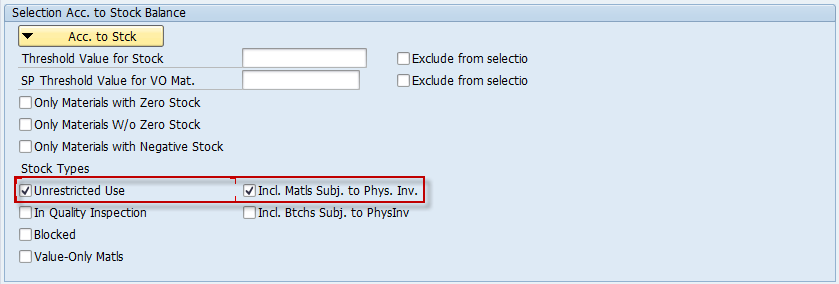
 button. List of per Material, Stock Type and Batch will be displayed.
button. List of per Material, Stock Type and Batch will be displayed.
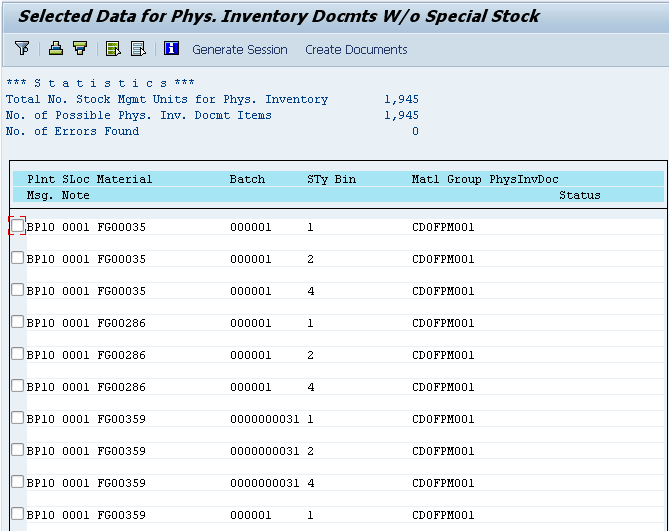
 button to select all line items and then click Create Documents
button to select all line items and then click Create Documents  button. List of Physical Inventory Documents created will be displayed.
button. List of Physical Inventory Documents created will be displayed.
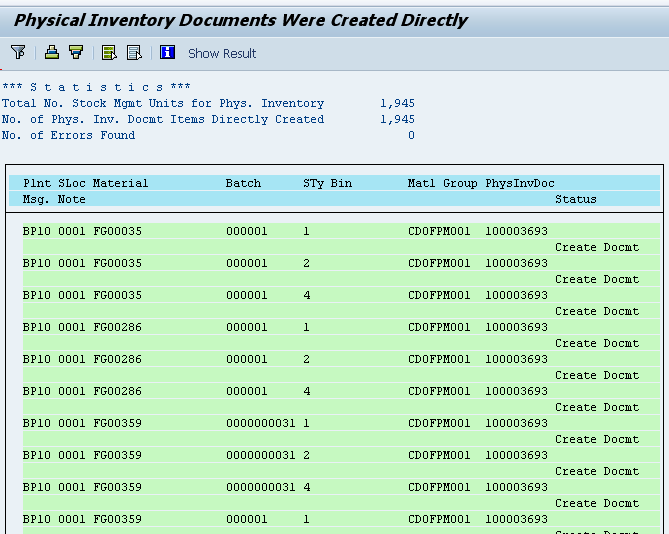


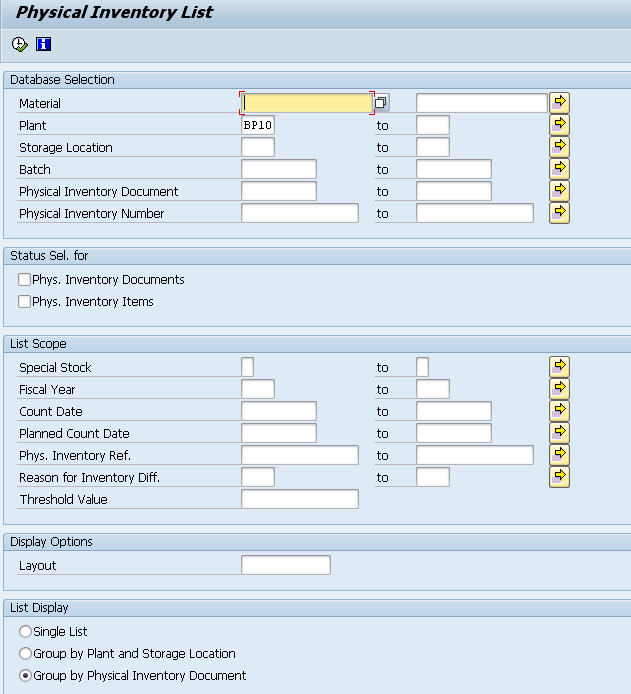
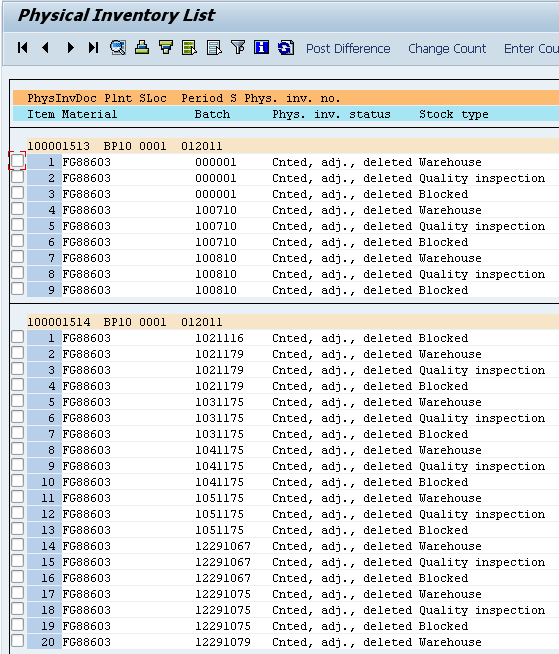
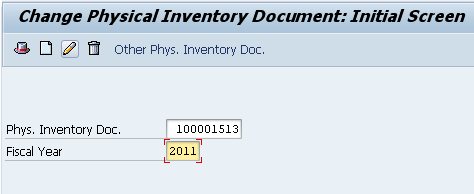
 button. A confirmation message will be displayed. Click Yes to confirm or No to cancel deletion
button. A confirmation message will be displayed. Click Yes to confirm or No to cancel deletion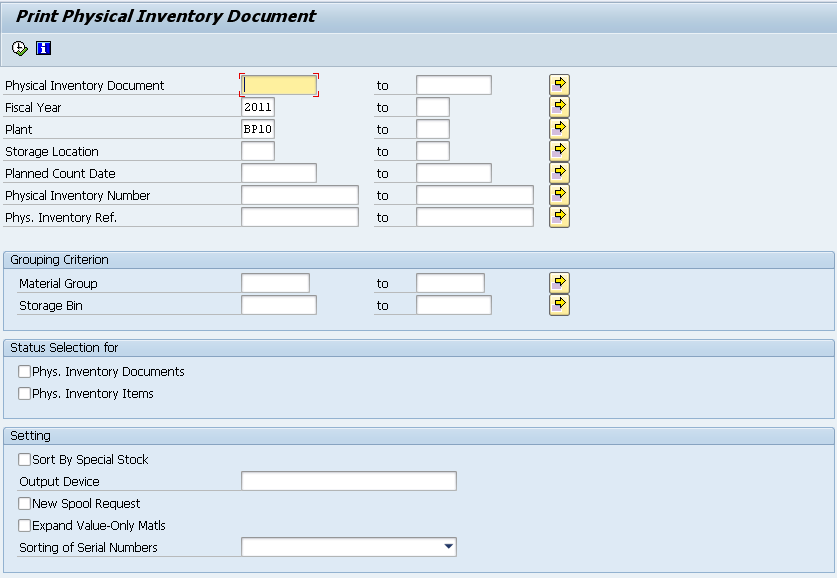
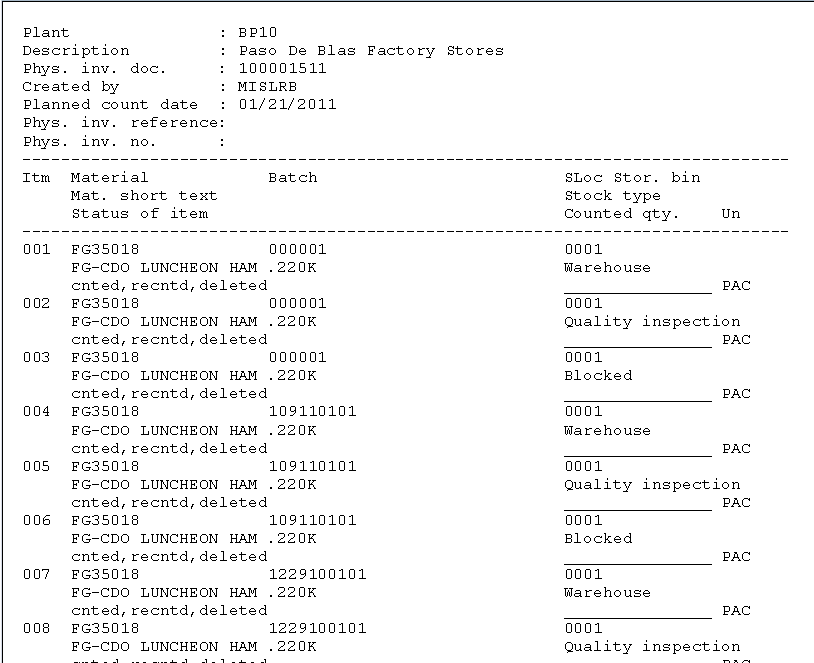
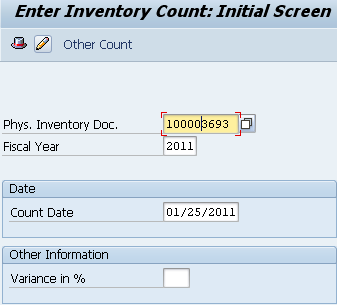
 button. List of items contained in the document will be displayed.
button. List of items contained in the document will be displayed.
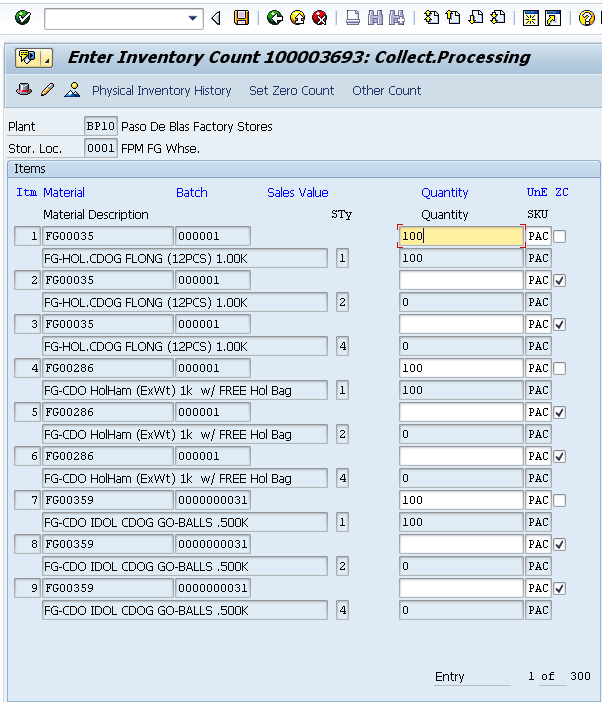
 the corresponding ZC column for items with zero (0) inventory. Click any of the Page navigation tools
the corresponding ZC column for items with zero (0) inventory. Click any of the Page navigation tools  to proceed from one page to another.
to proceed from one page to another. button to save count.
button to save count.